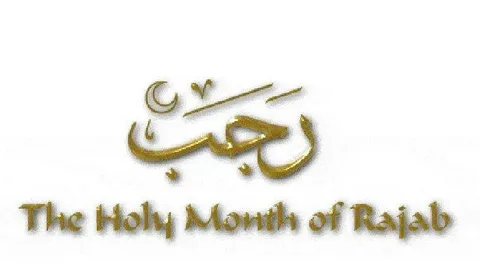Rajab, the seventh month of the Islamic lunar calendar, holds a special place in the hearts of Muslims worldwide. It is one of the four sacred months mentioned in the Quran, offering a unique opportunity for reflection, worship, and spiritual growth. Often seen as a gateway to Ramadan, Rajab encourages believers to realign their hearts and minds with the teachings of Islam, in this article on Arabian Tongue website we will explorer What is the significance of the month of Rajab.
Understanding the Islamic Calendar

Islamic months are based on a lunar calendar, consisting of 12 months. Unlike the Gregorian calendar, which follows the solar cycle, the Islamic calendar shifts annually, making Rajab occur at different times each year. This month precedes the highly anticipated months of rajab Shaban Ramadan, forming a spiritual journey for Muslims.
The Sacred Months in Islam
Allah mentions these months in the Quran:
“Indeed, the number of months with Allah is twelve [lunar] months in the register of Allah from the day He created the heavens and the earth; of these, four are sacred. That is the correct religion, so do not wrong yourselves during them…”
(Surah At-Tawbah 9:36)
The Quran highlights four sacred months: Dhul-Qi’dah, Dhul-Hijjah, Muharram, and Rajab. These months are marked by a call for heightened awareness, avoidance of sin, and increased devotion. Allah declares them as times when righteous deeds are especially rewarded.
Rajab: A Month of Reflection

the month of rajab is derived from an Arabic root meaning “to respect” or “to honor.” Even before Islam, it was revered as a time when fighting was forbidden, and peace prevailed. In Islam, its sanctity was emphasized, shifting focus from tribal customs to acts of faith.
Prophetic Sayings About Rajab
The Prophet Muhammad (peace be upon him) highlighted Rajab’s importance in various narrations. Although there are some weak hadiths regarding specific acts of worship, the general encouragement to increase good deeds and seek Allah’s mercy is undeniable.
Spiritual Practices During Rajab
Rajab offers a variety of opportunities for spiritual growth:
- Fasting: While not obligatory, voluntary fasting in Rajab is highly recommended. It is a way to cleanse the soul and prepare for the rigors of Ramadan.
- Prayer: Additional prayers, such as Nafl Salah, allow Muslims to connect deeply with their Creator.
- Dua and Istighfar: Making heartfelt supplications and seeking forgiveness are integral practices during this blessed month.
-
Rajab and the Preparation for Ramadan
Think of Rajab as a spiritual warm-up for Ramadan. It is the perfect time to start building habits like regular Quran recitation, mindfulness in prayer, and engaging in acts of kindness. The month allows Muslims to pace themselves spiritually, ensuring they are fully prepared for the heightened worship of Ramadan.
Fasting in Rajab
- While fasting in Rajab is not obligatory, it is highly recommended and considered a virtuous act.
- Some narrations indicate the Prophet Muhammad (peace be upon him) encouraged voluntary fasting in this month. However, specific Hadiths regarding fasting in Rajab vary in their authenticity, and scholars advise that any fasting should be done with the general intention of seeking Allah’s pleasure.
The Night Journey and Ascension (Isra and Mi’raj)
Many Muslims believe that the miraculous journey of Isra and Mi’raj (the Night Journey and Ascension of the Prophet Muhammad) occurred during Rajab, though exact dates are not confirmed. This event marks:
- The Prophet’s journey from Mecca to Jerusalem (Isra).
- His ascension to the heavens (Mi’raj) where he received the command for the five daily prayers.
Muslims use this time to reflect on the importance of Salah (prayer) and the Prophet’s closeness to Allah.
Increased Acts of Worship
Rajab is a month of seeking forgiveness (istighfar), engaging in voluntary prayers, and performing other acts of devotion, such as:
- Charity: Giving to the needy is particularly encouraged.
- Reciting Quran: Many Muslims focus on renewing their connection with the Quran during Rajab.
- Supplication: Increasing du’as (prayers) to seek Allah’s mercy and guidance.
Historical Events
- Battle of Tabuk: Some historical sources mention significant events, such as the preparations for the Battle of Tabuk, during Rajab in the lifetime of the Prophet Muhammad.
- Destruction of Idols: The clearing of idols from the Kaaba is also associated with this month, symbolizing purification.
HOW Arabian tongue shapes your journey of Learning Quran and arabic?
At Arabian Tongue, we empower you with the tools that allow for reflecting on the meanings of the Quran and sensing the greatness of the Creator. We incorporate unique teaching methods in our courses listed below:
- Learn Quran Online
- Online Arabic Classes
- Learn Tagweed Online
- Arabic grammar course online for beginners
- Quran Ijazah Course for Kids
FAQs
What makes Rajab a sacred month?
Rajab is one of the four sacred months in Islam, designated by Allah as a time for peace, reflection, and increased devotion.
How is Rajab different from other sacred months?
Rajab is unique as it stands alone, unlike the other three, which are consecutive. It precedes Ramadan, offering a chance to prepare spiritually.
What is Isra and Miraj, and why is it important?
Isra and Miraj is the miraculous journey of Prophet Muhammad (peace be upon him) to Jerusalem and his ascension to the heavens, highlighting his special status in Islam.
Are there any specific obligatory acts in Rajab?
There are no obligatory acts unique to Rajab, but Muslims are encouraged to engage in voluntary fasting, prayer, and good deeds.
How can I prepare spiritually during Rajab?
Focus on small, consistent acts like fasting, reciting the Quran, and attending community events to build spiritual momentum for Ramadan.
Conclusion
The month of Rajab is a precious time for Muslims to renew their faith, seek forgiveness, and prepare for Ramadan. By embracing the spiritual opportunities it offers, believers can strengthen their connection with Allah and set a foundation for lasting habits of worship.


